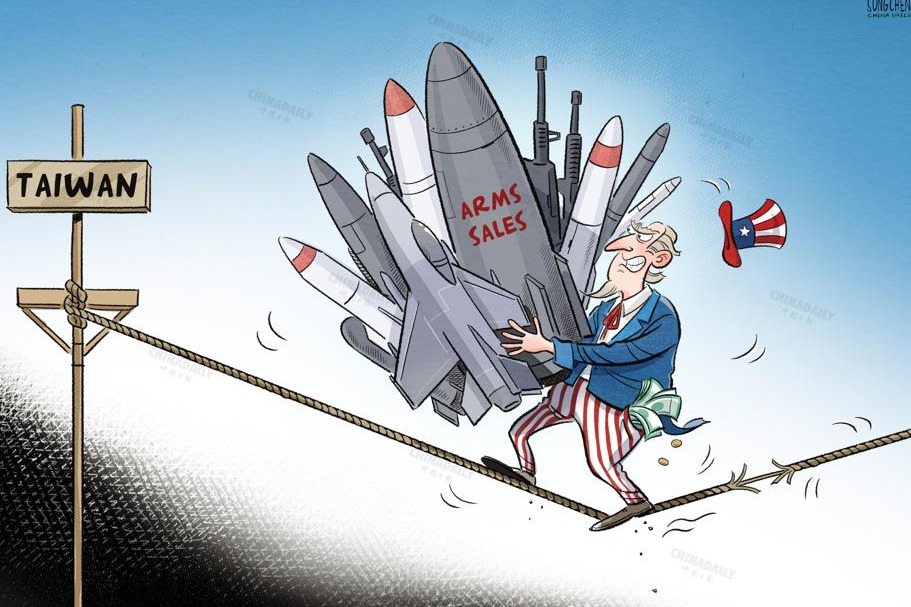DPP's wrong policies led to its failure


On Nov 26, Taiwan's voters went to the polls and cast their ballots in the island's local elections. Normally, candidates focus on internal issues ranging from transportation to health care in such contests. In this instance, however, the ruling Democratic Progressive Party (DPP) claimed that the election was much more important. Tsai Ing-wen, the DPP leader, proclaimed that the outcome would send an important message to the world.
In some respects, it appears that Tsai Ingwen succeeded as Taiwan's election received enormous media coverage and sent a message to the world. But it was not the message she hoped to convey. Rather, the ruling party suffered a humiliating defeat — some described it as the party's worst ever performance — and Tsai resigned as chairperson of the DPP. What happened? To answer that question, one must look back several years.
In Taiwan's 2015-2016 leadership election, Tsai Ing-wen campaigned on a populist platform. She promised to revitalize the island's struggling economy, reduce income inequalities, boost social welfare spending, diversify Taiwan's trade partners, clean up the environment and create good jobs for young people. At the same time, Tsai promised to resolve the government's "pension crisis" and balance the budget. As for relations with the mainland, the candidate was evasive. She refused to endorse the "1992 Consensus," — an understanding with Beijing that served as the foundation for cordial cross-Straits relations — and said she would handle the relationship according to "the will of the Taiwan people".
On Jan 16, 2016, the DPP won a decisive victory in the island's elections. Since that time, however, progress in many domestic areas has proved elusive. And relations with the mainland have cratered — the worst in decades.
On Nov 24, 2018, Taiwan's voters punished the DPP with a crushing defeat in the island's "9 in 1" local elections. Public opinion polls showed that an overwhelming majority of voters were "dissatisfied" or "greatly dissatisfied" with Tsai's performance. Ever since this debacle the DPP has sought to sidestep discussion of internal or "bread and butter" issues. Rather, it prefers to divert attention to external events and threats.
Shortly after the DPP's 2018 electoral disaster, the party's mouthpieces in Washington launched a campaign to pressure US lawmakers into inviting Tsai to deliver an address to the US Congress. Although the 2019 scheme failed, it signaled just how far the DPP was prepared to go to deflect attention from its domestic shortcomings and shift attention elsewhere.
During Taiwan's 2020 election, the DPP skillfully played the "China threat card" to its advantage. The idea was to shift the public's attention away from the island's domestic problems to "dangers" posed by Beijing. The tragic events in Hong Kong proved to be a windfall. Much to the surprise of some observers, the DPP embraced the position that the situation in Taiwan was somehow analogous to that in the special administrative region. The argument was ludicrous — but effective. Tsai and the DPP won a landslide victory.
Following the DPP's 2020 victory, the party and many foreign observers jumped to the lazy conclusion that the Kuomintang and other parties had become irrelevant. This was wrong. Polls consistently show a very low sense of party loyalty among the Taiwan people. In fact, they are not especially fond of the DPP or the KMT. Moreover, the same polls show most do not believe Taiwan's military can prevail if a military conflict breaks out with the mainland, and very few wish to actively participate in such a conflict.
Believing that a confrontational approach to the mainland would guarantee continued successes at the polls, Tsai and her party ramped up the approach after 2020. This proved to be a mistake. The KMT, while never becoming "pro-Beijing," embraced a pragmatic position that many viewed as more realistic and a lot less dangerous. It wants to reduce cross-Straits tensions and promote peace and prosperity. Moreover, the KMT fielded qualified candidates who focused on local and internal issues. Consequently, the DPP was trounced at the polls.
In the final analysis, it seems the "red scare" rhetoric and money spent to lure foreign politicians ranging from Nancy Pelosi to Mike Pompeo into flying to Taiwan did little or nothing to help the DPP. Indeed, perhaps the fallout from the Pelosi visit was the last straw. Of course, this is speculation. But one fact is clear. Namely, many voters in Taiwan have grown tired of the DPP's saber rattling as a campaign tactic. Rather, peace and prosperity now attract more support.
The author is Distinguished Professor Emeritus at Missouri State University and the author of numerous books and articles on Taiwan and the Chinese mainland. The views don't necessarily represent those of China Daily.
If you have a specific expertise, or would like to share your thought about our stories, then send us your writings at opinion@chinadaily.com.cn, and comment@chinadaily.com.cn.


































